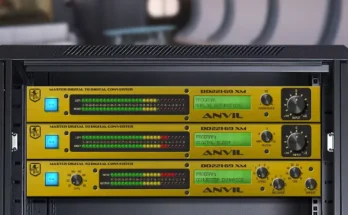Vintage Classics IR Pack v1.0.0 WiN
04 December 2019 | 3.02 GB
The Vintage Classics collection features iconic cabs from decades past and modern cabinets with a vintage vibe. Each cabinet is sampled in loving detail so you can craft your tone the way you hear it in your head.
Treat yourself to impulse responses from 22 iconic speaker cabinets. Bring life to lifeless simulations. Add some oomph to your amp sim hardware. Or, crank your tube amp to 10 at any volume.
For Redwirez’ 10th anniversary we’ve reimagined our collection with 10 years of customer feedback in mind. Yes! They sound different. They sound better!

What’s New in the Anniversary Edition
•Longer. Now 500ms for better bass definition.
•Smoother. Advanced processing to remove unwanted acoustic artifacts.
•Cleaner. Less noise, better SNR.
•Easier. Presets for commonly used studio techniques.
•Mix ready. We filter out the rumble and buzz. IRs sit better in the mix.
Why Redwirez
Each BIGbox cabinet is sampled at 0, ½, 1, 2, 3, 4, 5, 6 and 12 inches – at up to 6 different speaker positions. This systematic sampling method results in a “grid” of IRs with small, linear changes between them. Because the samples are predictable you can pick a starting point from our “Dialing in your tone” checklist or choose a preset, then quickly zero-in on the perfect sound.
You can use the same micing techniques used in a studio because each library is like a real cab. You like the graininess of your 57, but it has a little too much sizzle, then move it closer by an inch. You want two 57s with one off-axis. Go for it. You want to mic the cone and boost those highs for more air. You can.
A good guitar tone is built with many moving parts. Your setup is unique. Don’t settle for someone else’s idea of good tone. Hone your own.
What You Get
The collection contains: IRs and mixIR³ IR modules. IRs are packaged as WAV audio files in a variety of sample rates. They can be loaded into most any convolution software or hardware.
MixIR³ IR modules are for use with Redwirez mixIR³ only. Each module contains all IRs for a single cabinet in one file. Loading up an IR module in the mixIR³ brings up a point-and-click visual interface for selecting mics and mic position. Modules also provide controls for tweaking the cabinet’s impedance curve and bass response.

The mixIR³ plug-in is not included with the Vintage Classics library.
Sound Samples
•Helix: Bogner Uberschall
•Headrush FX: Satriani Style
•Helix: EVH Brown Sound
•AxeFx: More EVH Brown Sound
•Helix: Bogner Shiva – Jonn Mayer Style
•AX8/CAA3: Various Styles
•Helix: VOX AC15 + TS808
•Helix: Matchless Country Ballad
IR Features
•22 timeless speaker/cabinets used on some of the greatest recordings EVER
•Sampled with 14 industry-standard microphones, each with their own special sound
•Up to 6 mic positions to dial in the right tone for your amp
•9 different mic distances for different amounts of proximity effect, cabinet and roominess
•500ms IRs packaged in common sample rates: 44.1, 48, 88.2, 96kHz
•Aligned for better phase coherence. Mix multiple cabs and mics without comb filtering.
•Uncompromising signal chain. Cabs driven by a super-clean power amp, captured with classic Neve preamps and top-notch converters.
•Compatible with a wide range of recording software and hardware. If your plug-in or device can load a WAV file then it is likely compatible.
mixIR³ Module Features
•Exclusively for the Redwirez mixIR³
•All current Redwirez cabs can be loaded as modules into the mixIR³
•Navigate a virtual 3D cab to visually sculpt your tone
•Accurately model tube amp and speaker interaction with cab-specific impedance curves.
•Easily adjust cabinet bass response
•Equal loudness compensation. Constant level across IRs so you can make decisions based on tone not volume.
•MixIR³ plug-in is not included with the Vintage Classics library
IR Sampling
Redwirez IRs are sampled using a rigorous system. As a result, the change from one IR to the next is consistent and predictable. This allows you to dial in the perfect tone.
We sample the upper left (or top) speaker of each cabinet using up to 6 positions. The positions are (as shown above):
•Cap center
•Cap 45° Off Axis
•Cap Edge
•Cap Edge 45° Off Axis
•Cone
•Cone Edge
Off-axis means the mic as tilted at a 45° angle rather than pointed directly at the speaker.
For each speaker position, we sample at up to nine distances: 0″, 0.5″, 1″, 2″, 3″, 4″, 5″, 6″, and 12″.
The mic will pick up different aspects of the cabinet depending on the mic position. The farther the mic is from the speaker, the more bleed it will pick up from the other speakers in the cabinet.
The cap position is the brightest. It has the most high end. The closer you move to the cone position, the less high-end you will hear.
Mics also thin out as they get farther from the speaker. This is caused by the proximity effect exhibited by cardioid and figure-8 mics like the SM57 and R121. It boosts the low-end when the mic is close to the speaker.
Not every mic was sampled in every position and at every distance. Click on the Details links in the cabinet list below for a definitive list of IRs for each cab.
Speaker Cabinets Included
Fender Deluxe Reverb
(1) Oxford 12k5-6
Blackface era Fender Deluxe Reverb cab with a ’64 Oxford 12K5-6. Details…
Fender Dual Showman
(2) JBL D130s
Fender Dual Showman cabinet loaded with vintage JBL D130s. Details…
Fender Tweed Bassman Narrow Panel
(4) Jensen P10Qs
Reproduction Narrow Panel Tweed Bassman cabinet loaded with vintage ’57 Jensen P10Qs. Crunchy upper-mids, scooped low-mids, and tons of low-end below 70Hz. Details…
Fender Tweed Deluxe (1956)
(1) Jensen P12R
’56 Tweed Deluxe narrow panel with the the original, vintage Jensen P12R speaker, for the purists. Rounder and warmer sound than the Blue. Details…
Fender Tweed Deluxe (1956)
(1) Celestion Alnico Blue 12″
’56 Tweed Deluxe narrow panel with a replacement Celestion Alnico Blue speaker for a brighter tone with more high end sparkle. Details…
Fender Twin
(2) JBL D120Fs
’67 Fender Twin Reverb cabinet loaded with vintage JBL D120Fs. The D120s have more low-end than the C12Ns and a peak around 3700Hz, for distinctly edgier upper-mids. Details…
Fender Twin
(2) Jensen C12Ns
’67 Fender Twin Reverb cabinet loaded with vintage Jensen C12Ns. A little less bass than D120s and a peak around 2500Hz which gives it a crunchier sound than JBLs. Details…
Hiwatt SE4123 (1975)
(4) 50-watt Fane “Purples”
’75 Hiwatt SE4123 cabinet loaded with four vintage 50-watt Fane Purples. Details…
Marshall Basketweave (1968)
(4) Celestion G12Ls
’68 Marshall Basketweave 4×12 loaded with vintage Celestion G12Ls. We acquired this cab with the intent of hunting down some good T1221 Greenbacks for it, but we thought the G12Ls with their mellow high-end and ample bass would be a nice flavor to have around. Details…
Marshall Basketweave (1968)
(4) Celestion Heritage G12M20s
’68 Marshall Basketweave 4×12 loaded with 20 watt Celestion Heritage G12Ms. Brown sound all around. Details…
Marshall Basketweave (1968)
(4) G12H30 Blackbacks
’68 Marshall Basketweave 4×12 loaded with a matched quad of vintage 30 watt Celestion G12H Blackbacks. T1281 frames and 444, 55Hz bass cones from the late 70’s. Unleash your inner Jimi, or Jimmy, if you prefer. Details…
Marshall Basketweave (1968)
(4) G12M25 Greenbacks
’68 Marshall Basketweave 4×12 loaded with vintage Marshall-labeled 25 watt Celestion G12Ms. We searched long and hard to find this matched quad of T1221 frames and Pulsonic 003 lead cones. Details…
Matchless ES212
(1) Custom Celestion G12M25
Matchless ES212 is loaded with one custom voiced 30-watt Celestion G12H and one 25-watt Celestion G12M. We close mic our cabs, so we decided to treat this cabinet as three. We mic’ed the G12H30 and G12M25 separately and then made a 50/50 mix of both speakers. Details…
Matchless ES212
(1) Custom Celestion G12H30
Matchless ES212 where we mic’ed the custom voiced 30-watt Celestion G12H. Details…
Mesa Mark IIC+
(1) Electro-voice EV12L
Mesa Mark IIC+ cab with a Mesa Black Shadow EV12L. Details…
Mesa Mark IIC+
(1) Mesa MS12
Mesa Mark IIC+ cab with a Mesa MS12. More scooped mids than the EV12L and less aggressive upper-mids. Details…
Roland JC-120 2×12
(2) Roland 12s
Roland JC-120 Jazz Chorus with Roland 12″ speakers. Resembling a more scooped JBL D120, this cabinet produces squeaky clean guitar tracks. Details…
Speakerbox 1×12
(1) Celestion Alnico Blue 12″
The Celestion website describes this speaker as having a “glorious dampened attack, warm lows, mellow upper-mids and brilliant belllike top-end.” Guitar Player magazine has this to say about it: “The Blue is far and away the most tonally sophisticated — as well as the loudest — speaker in this roundup. Its chime and midrange complexity are truly magical, and it never sounded harsh or brittle. The Blue handles sparkling rhythms and milkshake-thick lead tones with equal poise, and is an unbelievably dynamic and multi-dimensional speaker that sounds great with any amp.” Details…
Speakerbox 1×12
(1) Celestion G12H30
The Celestion website describes this speaker as having “a heavier magnet than the G12M, this faithful recreation captures the unmistakable mojo of late 60s rock guitar tones… It exhibits a pleasing, strong low-end, complex and buttery mid-range and a finely detailed top-end, the G12H is excellent for cranking out huge, dark power chords, with smooth and rich bridge pickup tones and flutey neck pickup tones.” Details…
Supro Thunderbolt S6420
(1) 15″ Jensen
Supro Thunderbolt S6420 cabinet with the original 15” Jensen speaker. Decent low-end for a small open-backed cabinet. A boost around 550Hz gives it some mid-range “honk” and crunchy upper-mids. Details…
Vox AC30
(2) 12″ Vox-labeled Alnico Blues
Vox AC30 loaded with two Vox-labeled Celestion Alnico Blues made in the UK. Chimey Vox goodness. Details…
Vox AC30
(1) 12″ Vox-labeled Alnico Silvers
Vox AC30 loaded with two Vox-labeled Alnico Silvers. These speakers are 25 watts, use T1656 frames, and have Pulsonic cones made for the Thomas Organ Company in the 60’s. Slightly less extended upper mids than the blues, same cones as the early greenbacks. Cool speakers in pristine condition.
Microphones Included
We experimented with a wide range of microphones before we settled on a final lineup. So, not every mic was used on every cabinet. Check the Details link for each cab for a listing of the mics used on that cabinet.
•AKG C414B-ULS
•Audix i5
•Beyerdynamic M160
•Coles 4038
•Neumann U47
•Neumann U67
•Neumann U87
•Neumann KM84
•Neumann M8/CMV563
•Neumann M7/CMV563
•Royer R121
•Sennheiser MD421N
•Sennheiser MD441
•Sennheiser MD409
•Shure SM7
•Shure SM57
•TAB-Funkenwerk SM57
•Electrovoice RE20
•Earthworks TC30/M50
•Lawson L47
•Blue Bottle/B4 (Room only)
•Blue Bottle/M7
•Heil PR30
[toggle title=”Home page”]https://tinyurl.com/seeh7rb[/toggle]

http://alfalink.to/741a5b6ed383df37ba2e
Please REPORT in Comment Broken Links




